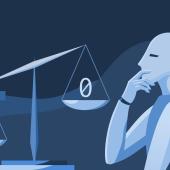This series will focus on using technology in the context of developing a personal and portable kit bag of tools to make our work easier and more fun, regardless of location.
In a world where remote and other flexible work arrangements may soon become the norm, or at least far more common, lawyers need an essential toolkit to do their work more efficiently and painlessly.
The tool I decided to address first is developing a personal knowledge management system tailored to your preferences and the way you work. Technology has finally developed to a point where almost everyone has access to the tools needed to create such a system.
In those days, if we wanted to set up a personal knowledge management system, it involved Xeroxing the book and binder sections.
This was not always true. Back in the day, our reference resources were physical law libraries containing books and loose-leaf binders. We later gained access to databases like Lexis and Westlaw, but the services were so new, expensive, and hard to use that many lawyers avoided them. In those days, if we wanted to set up a personal knowledge management system, it involved Xeroxing the book and binder sections we needed or printing out the Lexis and Westlaw cases we found and tucking them into a physical filing cabinet in our offices.
Lawyers each had their own stash of reference materials and were often possessive about it; they would only share those resources with colleagues they liked. That was in part because of how much work was involved in accumulating those knowledge assets, and the risk that the hard copy would be lost.
Today, that approach to personal knowledge management feels quaint. Any relevant information is readily available in digital form, which means you can access it from anywhere and save it in what, for all intents and purposes, is practically unlimited storage space. It also means you can catalog it, search within it, set reminders around it, and do a myriad of things that were impossible even 10 years ago. But that begs the question: How should you implement your personal knowledge management system? What are some of the best practices or options to consider?
It’s important to be independent
First, let's consider why you should have such a system in the first place. You may work in a law department with a perfectly adequate knowledge management system. You also have access to the internet, so you could theoretically simply rediscover any other knowledge assets.
The problem with relying on a departmental system is twofold: First, their system may not be tailored to your kind of work, and therefore may not contain the kind of assets you need. Second, you may find yourself more independent in the future than you have been in the past.
You may also find yourself in the position of working remotely or having several part-time jobs at once or even becoming an independent consultant. In any of those cases, it makes sense to maintain your own personal knowledge management system that you can access from anywhere with the precise knowledge assets you believe are important.
That last point is essential, both in the departmental reference and in the rediscovery contexts. As more and more digital knowledge assets become readily available, there is an understandable tendency to “over-collect.” In my experience, law departments often accumulate all the knowledge assets that seem even superficially valuable. Furthermore, most departments don’t invest the time to properly curate content, and collections rapidly begin to contain irrelevant and outdated.
As more and more digital knowledge assets become readily available, there is an understandable tendency to “over-collect.”
And we all know that the internet seems to generate at least as many dubious reference materials as legitimate ones. When that happens, the signal to noise ratio drops and researching them can begin to waste users’ time instead of saving it, because it will send them off on wild goose chases.
If you develop and maintain your own system, you can ensure that it will facilitate your work rather than undermining it. For these and other reasons, I strongly recommend at least considering developing your own personal knowledge management system.
Knowledge asset categories
Here are some of the categories of knowledge assets you might want to include in your collection.
Books
I know that few lawyers refer to books these days, but I think that is short-sighted. Legal and other subject matter reference books are invaluable resources, and the fact that you can carry literally hundreds of them on your smartphone or tablet (or, I suppose, your laptop) and search through them instantly for just the bits you need is fantastic. For example, I spent most of my career practicing insurance law, and I have collected digital versions of a number of insurance underwriting and claims reference texts.
And did you know that you can use either Apple Books or the Kindle apps to import any books in the epub format or any PDFs for easy access, even if you didn’t buy them through Apple or Kindle? You can also divide those materials into categories (e.g., antitrust, insurance, or contracts) for easy browsing. This means you can use Apple Books or Kindle as the digital equivalent of your prior physical bookshelves and keep them available wherever you go.
Articles
This category probably comprises the vast majority of your already existing digital reference library, and for good reason. There are thousands of helpful articles available on the internet, and it makes sense to save them so that random changes in search algorithms or other events don’t prevent you from finding them quickly again when you need them.
Plus, loading those assets into some of the more recently developed applications enable features we never would have imagined even 20 years ago. AI enabled relevance searches like DEVONthink allow you to search for a given term and have the AI not only find that specific term but also articles on closely related subjects that don’t use that term anywhere in the article. Cross-linking between articles or even paragraphs with DEVONthink, Obsidian, and Notion allows you to insert your own links between articles or even paragraphs you consider related. You can also easily export sections into Word or other word processors with LiquidText.
Precedent templates
No matter what kind of law you practice, you should try to develop precedent templates to help automate your workflow. I have templates for different kinds of emails, meeting notes, contracts, pleadings, memos, and other things I have developed over the years. Most of these were created from my own work products after I realized they could be reused in similar contexts, but some were templates I created from work originally done by outside counsel or colleagues or counterparties.
Some of these precedents I set up in text expansion apps (in my case, TextExpander), so that all I have to do to trigger them is type a couple of keystrokes. Others I keep in Word documents in file hierarchies housed in the cloud, and they contain various alternatives and annotations to remind me when to use which provisions. It can take a little time to set up a proper precedent template system, but that investment will be repaid with huge dividends in terms of very quickly creating well-crafted and thoughtful work products.
Websites
We all have discovered certain sites whose consistently high quality of content have made them favorites. There are various ways to make them available without having to rely on our memories. One way is to bookmark them in your browser of choice, so you can later skim through those bookmarks to find ones you need. Another way is to subscribe to their RSS feeds, which I wrote about a few months ago. I like RSS much better, because not only will it hold the list of sites just like a bookmark would, but it will also surface new articles as they are published.
Don’t forget that you can use Command or Control F in any browser on any site to locate specific search terms.
Colleagues and other Subject Matter Experts (SMEs)
Knowledge management experts have long divided knowledge assets into two categories: explicit knowledge assets, which includes all the prior categories listed here and any recorded knowledge assets; and tacit, which refers to the knowledge and expertise inside people’s minds that have not been recorded.
Most of us have a mental list of “go-to” colleagues or outside counsel whom we know are experts in various areas. The trouble is that our memories are fallible, so we don’t always remember precisely who knows what. I recommend developing some system for capturing those SMEs.
You could develop your own list or database for that, but I recommend using the database you already use to capture names, addresses, birthdays, etc., which is whatever contacts app you use. Most of them have notes fields you can use for the purpose that are searchable, and most of them are available cross platform and in the cloud. So, if you come up with a naming convention for the skills you are likely to need, you can simply annotate your contacts with the skills they have for easy location later.
More to come
In a future article, I will provide some practical advice and best practices for capturing, categorizing and cross-referencing, and curating your knowledge assets, but I think this is enough to get you thinking about how you would like to develop your own personal knowledge management system if you don’t already have one, or improving the one you do have.




